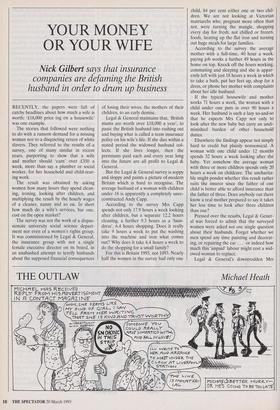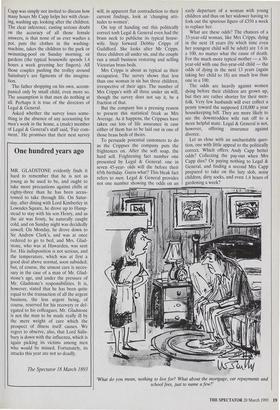YOUR MONEY OR YOUR WIFE
Nick Gilbert says that insurance
companies are defaming the British husband in order to drum up business
RECENTLY, the papers were full of catchy headlines about how much a wife is worth: 118,000 price tag on a housewife' was one example.
The stories that followed were nothing to do with a ransom demand for a missing woman nor to a disquieting return of white slavers. They referred to the results of—a survey, one of many similar in recent years, purporting to show that a wife and mother should 'earn' over £350 a week, more than say a plumber or social worker, for her household and child-rear- ing work.
The result was obtained by asking women how many hours they spend clean- ing, ironing, looking after children, and multiplying the result by the hourly wages of a cleaner, nanny and so on. In short how much do a wife's services, bar one, cost on the open market?
The survey was not the work of a dispas- sionate university social science depart- ment nor even of a women's rights group. It was commissioned by Legal & General, the insurance group with not a single female executive director on its board, in an unabashed attempt to terrify husbands about the supposed financial consequences of losing their wives, the mothers of their children, to an early demise.
Legal & General maintains that, 'British mums are worth over £18,000 a year', to panic the British husband into rushing out and buying what is called a term insurance policy on his wife's life. If she dies within a stated period the widowed husband col- lects. If she lives longer, then the premiums paid each and every year long into the future are all profit to Legal & General.
But the Legal & General survey is soppy and sloppy and paints a picture ofcmodern Britain which is hard to recognise. The average husband of a woman with children under 18 is apparently a completely unre- constructed Andy Capp.
According to the survey Mrs Capp spends not only 17.9 hours a week looking after children, but a separate 12.2 hours cleaning, a further 9.3 hours as a 'laun- dress', 6.4 hours shopping. Does it really take 9 hours a week to put the washing into the machine and iron what comes out? Why does it take 6.4 hours a week to do the shopping for a small family?
For this is Britain 1993, not 1093. Nearly half the women in the survey had only one child, 84 per cent either one or two chil- dren. We are not looking at Victorian matriarchs who, pregnant more often than not, were turning the mangle, shopping every day for fresh, not chilled or frozen, foods, heating up the flat iron and turning out huge meals for large families.
According to the survey the average mother with a full-time, 40 hour a week, paying job works a further 49 hours in the home on top. Knock off the hours working, commuting and sleeping and she is appar- ently left with just 18 hours a week in which to take a bath, put her feet up, shop for a dress, or phone her mother with complaints about her idle husband.
If the typical housewife and mother works 71 hours a week, the woman with a child under one puts in over 90 hours a week. Her husband is such a lazy so-and-so that he expects Mrs Capp not only to look after the new baby but carry an undi- minished burden of other household duties.
Elsewhere the findings appear not simply hard to credit but plainly nonsensical. A woman with one child under 12 months spends 32 hours a week looking after the baby. Yet somehow the average woman with three or more children spends only 20 hours a week on childcare. The uncharita- ble might ponder whether this result rather suits the insurer since the father of one child is better able to afford insurance than the father of three. Does anybody out there know a real mother prepared to say it takes her less time to look after three children than one?
Pressed over the results, Legal & Gener- al was forced to admit that the surveyed women were asked not one single question about their husbands. Forget whether we men spend any time painting and decorat- ing, or repairing the car . . . or indeed how much this 'unpaid' labour might cost a wid- owed woman to replace.
Legal & General's downtrodden Mrs Capp was simply not invited to discuss how many hours Mr Capp helps her with clean- ing, washing up, looking after the children. The clear inference, casting serious doubt on the accuracy of all those female answers, is that none of us ever washes a pot, puts the clothes in the washing- machine, takes the children to the park or swimming-pool on Sunday morning, or gardens (the typical housewife spends 1.4 hours a week greening her fingers). All those couples pushing the trolley around Sainsbury's are figments of the imagina- tion.
The father shopping on his own, accom- panied only by small child, even more so. The assumption is that men do nothing at all. Perhaps it is true of the directors of Legal & General.
Asked whether the survey loses some- thing in the absence of any accounting for men's work in the home, a (male) member of Legal & General's staff said, 'Fair com- ment.' He promises that their next survey will, in apparent flat contradiction to their current findings, look at 'changing atti- tudes to women'.
On top of handing out this politically correct tosh Legal & General even had the brass neck to publicise its typical house- wife. Step forward Debbie Cripps of Guildford. She looks after Mr Cripps, three children all under six, and the couple run a small business restoring and selling Victorian brass beds.
Mrs Cripps is about as typical as their occupation. The survey shows that less than one woman in six has three children, irrespective of their ages. The number of Mrs Cripps's with all three under six will, though the survey does not say it, be a fraction of that.
But the company has a pressing reason to present this statistical freak as Mrs Average. As it happens, the Crippses have taken out lots of life assurance in case either of them has to be laid out in one of those brass beds of theirs.
To persuade potential customers to do as the Crippses the company puts the frighteners on. After the soft soap, the hard sell. Frightening fact number one presented by Legal & General: one in seven 45-year- olds will die before their 65th birthday. Guess what? This bleak fact refers to men. Legal & General provides not one number showing the odds on an
early departure of a woman with young children and thus on her widower having to fork out the spurious figure of £350 a week to replace her.
What are these odds? The chances of a 33-year-old woman, like Mrs Cripps, dying in the next 18 years (by which time even her youngest child will be adult) are 1.6 in a 100, no matter what the cause of death. For the much more typical mother — a 30- year-old with one five-year-old child — the odds of dying in the next 13 years (again taking her child to 18) are much less than one in a 100.
The odds are heavily against women dying before their children are grown up, but they are rather shorter for their men- folk. Very few husbands will ever collect a penny toward the supposed £18,000 a year housekeeping bill. They are more likely to see the downtrodden wife run off to a more helpful mate. Legal & General is not, however, offering insurance against divorce.
Let us close with an uncharitable ques- tion, one with little appeal to the politically correct. Which offers Andy Capp better odds? Collecting the pay-out when Mrs Capp dies? Or paying nothing to Legal & General, and finding a second Mrs Capp prepared to take on the lazy slob, noisy children, dirty socks, and even 1.4 hours of gardening a week?
`What do you mean, nothing to live for? What about the mortgage, car repayments and school fees, just to name a few?'



























































 Previous page
Previous page